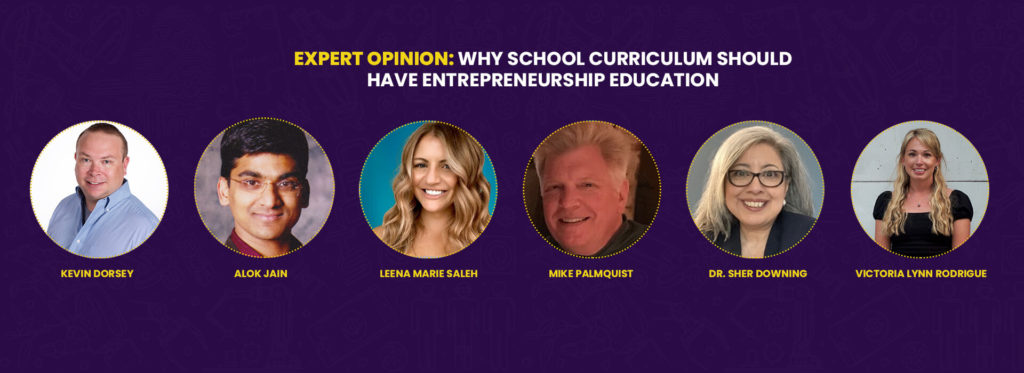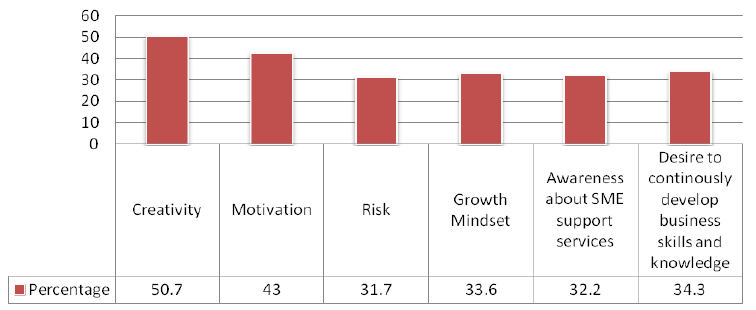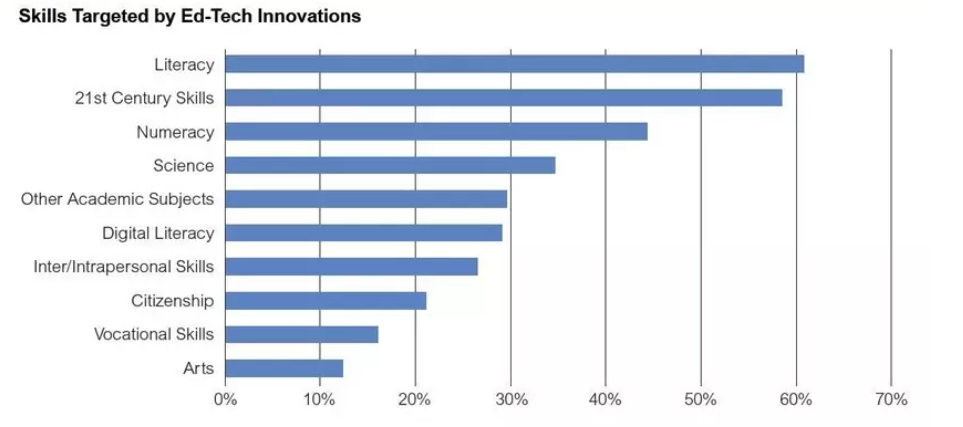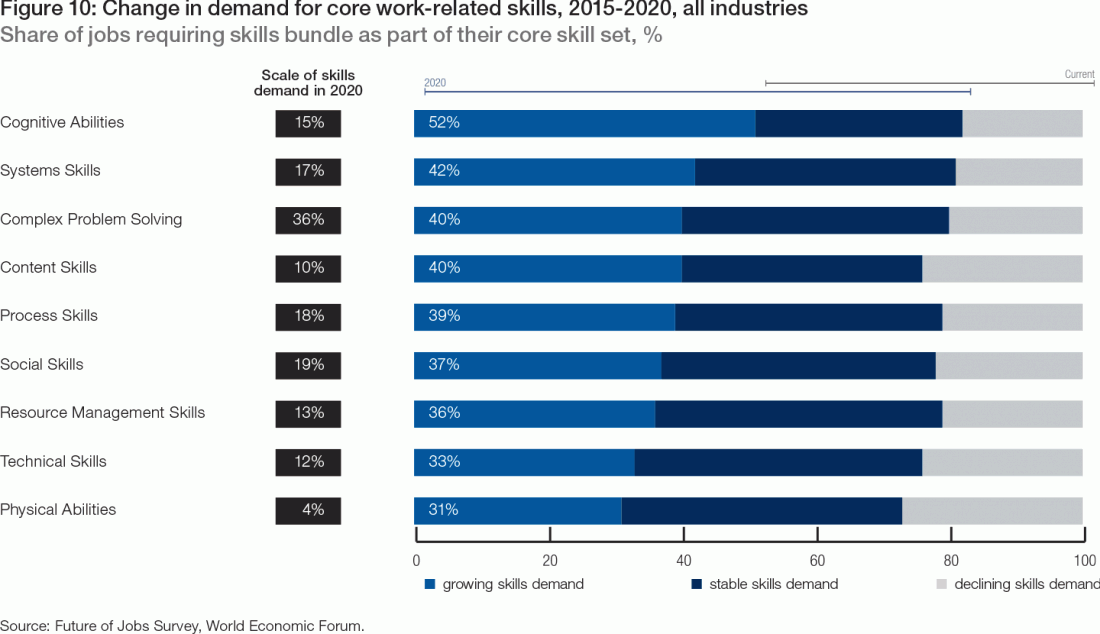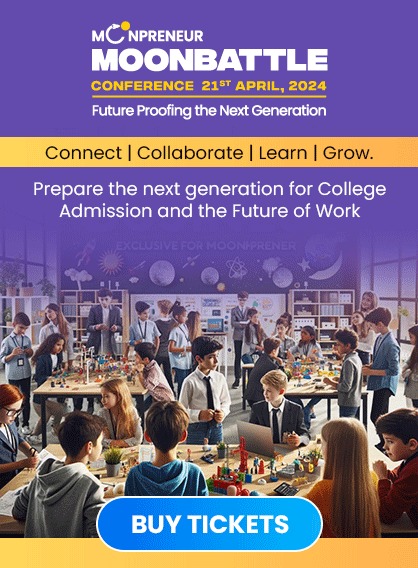Moonpreneur
Entrepreneurship is no longer an adults-only concept. In today’s day and age, several children earned the title of young entrepreneurs, setting an example for their peers. The significance and the role that entrepreneurship plays in our society have been widely recognized.
The importance of having an entrepreneurial mindset is immense, and those who possess entrepreneurial skills find themselves punching above their weight in today’s demanding world.
Source: Research Gate
Entrepreneurship is no longer simply related to business, but it has turned itself into a life skill to be inculcated in young children and teenagers. Entrepreneurship not only helps in developing shrewd mindsets but also promotes positive life skills, innovation, and obviously profit.
Parents and educational institutions have to share the responsibility and workload of creating an entrepreneurial mindset in children. Let’s find what these experts have to say on the importance of entrepreneurship and why it should be included in the curriculum.

1. Kevin Dorsey
With years of experience in the education field, Kevin Dorsey is currently an EdTech Advisor in GoGuardian. Earlier he was in charge of the Director of Technology in Pennsbury School District and Springfield Township School District.
Kevin said that for years educators have been told they are preparing students for jobs that don’t yet exist. That has become even more evident during the COVID-19 pandemic. Not only where schools suddenly shifted to online teaching and learning, but the entire economy was also turned on its head. I know several individuals who closed their businesses due to the prolonged shutdown. Many of these individuals have reinvented themselves to starting completely new businesses.
Citing an example, Kevin stated that a local private driver who used to transport people back and forth to the airport lost her business as soon as travel came to a halt. She now is a professional podcaster with supporters from all over the globe and supports such as Ellen DeGeneres.
Without courses in entrepreneurship skills, this individual may still be without work. As an individual who prefers to be her own boss, entrepreneurship education is vital.
MUST-WATCH: Is it Really Worth Pursuing Entrepreneurship?
“Entrepreneurship is very important because not all students who are graduating high school are heading to college or career and technical education. Some students decided to enter the military or enter the workforce. Students who have a solid understanding of starting a business, running a business, and have partaken in entrepreneurial skills are enabled by these skills to start their own business. Providing students the option to participate in entrepreneurship education is setting the student up with lifelong skills for success,” Kevin added.

2. Leena Marie Saleh
Leena Marie Saleh is a former educator with more than 10 years of classroom experience and is extremely passionate about the world of technology and how it transfers into the classroom to make students ready for the future.
She believes that providing students the skills for our future is absolutely vital and is important to creating a more equitable opportunity for all students. She also believes that exposure creates opportunity.
Leena has worked with hundreds of educators, thought leaders, and EdTech companies, guiding them through this next ‘ERA’ of education.
Leena, who has worked with hundreds of educators, thought leaders, and EdTech companies guiding them through this next era of education, explains that our world is ever-changing at exponential growth to fully digital. Technology will just continue to evolve at an even faster rate. There is no slow-down in sight. Soon most things in our everyday life will be fully automated. Therefore, entrepreneurship education for kids has become crucial.
But what does that mean for our students? Does our world currently prepare them for the 21st-century era of learning? To be frank it doesn’t.
Students come out of school with skills not relevant to what our world is like. Students are lacking the collaborative, problem-solving skills set to achieve at a high level. What is unique about this generation of learning and students is that they have a wealth of knowledge at their fingertips.
You can find courses, a program for anything you want to learn at any time or any moment by simply tapping a few buttons on a smart device, and boom! It is right there. There is no waiting, no wondering if the information will be there like in the olden days when we had to read a newspaper or head to the library only to find an outdated copy or for it to not even be there.
“There is a big gap in the curriculum that we are offering to our students. Are there essential skills woven throughout their daily learnings? Yes, but it is bigger than students are missing how to fail and bounce back when you do. To provide students with authentic learning and opportunities, students should learn how to become entrepreneurs. With over ⅓ of the student population wanting to be an influencer of some kind, the need is even higher. What do these students need to know?
They need to know how to pitch a product, how to create a business plan, file a trademark, edit, film, do project management, etc. All the tasks to be an “influencer” are all skills that are learned throughout business schools. Giving students the ability to achieve at a high level by introducing them to how to be an entrepreneur will provide skills that will translate to any job that they choose to do past the K-12 space.
Our world is not limited to what you can do but what you are willing to do. If we can show these skills earlier students will be positioned for greater opportunities. Let’s set our students to up skills for the future rather than the past,” Leena added.

3. Alok Jain
Alok Jain is the CEO and Co-founder of the Silicon Valley-based EdTech start-up Moonpreneur. He is a serial entrepreneur with four successful companies in his list of accolades. His most recent venture, Moonpreneur Inc., is disrupting the EdTech sector.
An IIT-alumni, Alok’s vision is to bring about a change in the way children are prepared outside traditional classrooms. With the brain of an entrepreneur and the heart of a father, Alok decided to create this company that imparts children with an entrepreneurial and innovative mindset.
His sole focus currently is to secure the future of the young generation through hands-on entrepreneurial training, STEAM-based learning, and an outcome-focused approach via the Moonpreneur’s program.
Alok explains that the current education system is lacking in more ways than one. They are still taking the traditional route, which will not be of major help to children in the future. There are a set of skills that will play a crucial role and schools are failing to focus on those. One of these is entrepreneurship skills. Entrepreneurship education for kids contains a wide range of skills that are future-forward. Below is a graph that highlights the change in demand for core work-related skills-
Source: World Economic Forum
“As parents and educators, we want the best for our children and the only way to do that is to think of ways that can make their future secure. Teaching entrepreneurial skills is no longer something that only business schools should be teaching. Entrepreneurial education will be an asset for children.
It should be a part of the school curriculum right from the beginning and progress through all levels of education. With an entrepreneurial mindset, children are more likely to take up challenges and opportunities and not be afraid of taking risks whenever required.
Understanding your own persona and belief system and being able to present it, as well as listen to the opinion of others is what entrepreneurship can teach. It is an important trait that comes with having an entrepreneurial mindset,” Alok said.

4. Mike Palmquist
Mike Palmquist, an independent consultant, has over 25 years of EdTech product design and development leadership for educational and consumer markets. He has his focus on literacy, personalized learning, game design, creativity tools, English language learning, user experience & user interface, formative evaluation, and concept development.
According to Mike, five years ago, Gallop surveyed over 600,000 U.S. students in grades 5– 12. Out of these, only 20% of students agreed that they were getting to do what they did best at school. If these were an online service’s ratings, it would not be in business.
In 2018, Gallop published a survey of K-12 School District Superintendents in which 71% strongly favored scaling back current curriculum and standardized testing for more apprenticeship and internship opportunities – more learning by doing.
Mike explains that future-ready learning should focus on talent identification and development to maximize each student’s potential. The talent here includes all intelligence: verbal, logical, musical, physical, interpersonal, visual. (Gardner, 1983).
A successful learning environment follows students’ engagement and response to the activities. Modeled after 21st-century work, learning activities should be collaborative, solution-oriented, “anytime/anywhere”, mobile-first, media-savvy, data-oriented, iterative, and agile.
In that environment, a student-centered focus should be the norm. Students are owners and agents exploring real-world domains in small teams, learning to work together by doing something –a required step, decisions, deliverables, and timelines.
“Learning environments like this will replace standard curriculum report cards with student portfolios of meaningful work– samples of projects, badges of engagement, records of progression and metrics, and completed pathways. Portfolios could provide meaningful data on personal strengths as well.
It will also help more students understand what they’re good at doing and, more importantly, what their passions are. More of their educational experience will also mimic the kinds of experiences they will see in many work settings. That kind of education will be valued and sought after by those that are hiring,” Mike said.

5. Dr. Sher Downing
Dr. Sher Downing is a consultant and industry coach and the CEO & Founder of Downing EdTech Consulting, a company specializing in strategic planning, creative development, and executive services for developing former higher education eLearning and IT personnel with specialized skills to find their next options.With over 30 years of experience in higher education including leading online learning and technology initiatives for public, private, and for-profit higher education institutions, Downing understands the vendor to the client, educator to technical expert relationships, and the impact it has on organizations.
She is the host of the EdTech Speaks podcast, founder of the Speaker’s Resource Group membership service, a best-selling international co-author, regular contributor to Forbes, HBR Ascend, and Medium and serves as a university board trustee, university law school board member, international speaker, and presenter.
Giving her opinion on the subject, Sher said, “Entrepreneurship education can impact globally through product development and services, and prepare students for learning opportunities. Students began the lessons of entrepreneurship during the pandemic. By observation, they witnessed changes to how they live and learn. Their transformation has included the skills of negotiations with parents or teachers, networking online, time management and output, and using online research to solve problems.”
“Today’s educators have an opportunity to incorporate entrepreneurial lessons into the standard curriculum, closing the gap between theory and practice. Providing opportunities for students to turn ideas into a project that facilitates understanding business concepts will value their lifelong learning,” Sher added.

6. Victoria Lynn Rodrigue Wynne
Victoria Lynn Rodrigue has over 15 years of experience in education, including K-12 and higher education. She started teaching in Vienna, Austria while studying music on a Fulbright fellowship. She earned a Master’s Degree in Music History from the University of Michigan-Ann Arbor before going on to build her education career in the San Francisco Bay Area. She was a member of the founding administrative team that opened Basis Independent Silicon Valley in San Jose, and she went on to serve as a principal at Meira Academy in Palo Alto for five years.
For the last six years, she has served as an accreditation team member and visiting committee chair with the Western Association of Schools and Colleges. She is currently a partner at BTS Spark, a not-for-profit education practice that works to transform schools and school leaders through mindset-based coaching.
Victoria said, “In March of 2020, educators around the world faced the enormous challenge of adapting to online learning. I was a principal at the time and remember vividly the sense that the education system I had known since my childhood was about to change dramatically. I was used to planning, to the slow pace of change in education, and this was unprecedented.
However, as colleges dropped standardized testing requirements and the College Board moved AP exams online, I recognized that this was also an opportunity to rethink our approach to education, one that had long been out of step with the realities of the 21st century. The pandemic also exposed and exacerbated major inequities in society and the education system. It became painfully clear which students had access to devices, reliable internet, and a quiet workspace and which students didn’t.
It is not surprising that the same students who had struggled before the pandemic now struggled to find a quiet space to attend their online classes and reliable internet to complete assignments. These issues will need to be addressed if we intend to provide equal educational opportunities to all students.”
She further added that moving forward, it’s hard to see how we can go back to the way we did things in 2019. Our rigid, test-focused, one-size-fits-all approach to education wasn’t working before March 2020. Stagnant wages, rising costs, rising inequality, and the reverberating challenges of the pandemic and climate change will require adaptability and creativity. To meet these challenges, students and educators will need to adopt a more flexible mindset.
“One approach is entrepreneurship education, which leverages experiential learning to develop non-cognitive skills, such as collaboration and problem-solving, and promote career readiness. This type of learning can also help address systemic inequities in our education system, as research suggests that at-risk students who develop these non-cognitive skills early are more likely to enroll in postsecondary education, be prepared for the workforce, and engage in entrepreneurial activity.
I hope that the challenges of the pandemic will lead us to transform education in this country so it works for all students,” Victoria concluded.
Final Words
This being said, very few schools have realized the importance of teaching entrepreneurship to their students. Given the pace at which things are changing and how the future of work is going to be very different from what it is today, children who have entrepreneurial skills will stand out and achieve more.
The world is changing rapidly with technology and so is the nature of the workforce. Children cannot rely on a single route of learning that the traditional teaching methodology follows. It is high time that educational institutions focus on making their students future-ready and prepared for the workforce of the future. Entrepreneurial skills are at the core and it is important that we shape the mindsets of our children in a way that allows them to become successful in the future. Moonpreneur’s Innovator Program is a wonderful educational program that empowers and nurtures children and young adults to become future innovators and entrepreneurs.
Moonpreneur has identified the needs of tomorrow’s world and is making immense efforts to bring in a change in the education system with their future-forward learning. Do you want your child to become a leading innovator of tomorrow? Book a free trial today.


